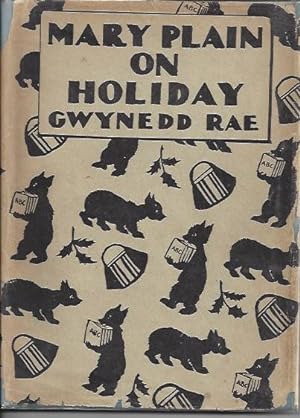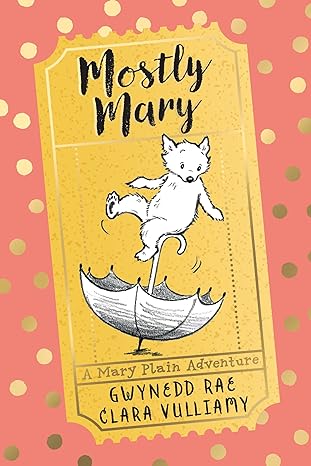For the #1937 Club: Mary Plain on Holiday by Gwynedd Rae
Readers of a certain age (mine) may remember Gwynedd Rae's Mary Plain books. I have fond memories of sitting on one of the little wooden chairs in the children's section of Bromley Public Library, working my way through the adventures of the bear cub from Berne while my mother chose her novels from the grown ups' shelves.
The series was old before I first encountered it (I don't quite date from 1937...although the last Mary P book was not published until 1965), and I did wonder how it would read now, all these decades later. I needn't have worried; I enjoyed Mary Plain on Holiday just as much, in fact probably more, than I had before, because now I could also appreciate Rae's skill in creating stories that entertained children whilst also amusing their long suffering parents; their dry wit that would have flown straight over my six year old head.
 |
| Mary Plain at the nursery show - illustration by Janina Ede |
Mary Plain is a small bear from the Bear Pits at Berne. And no, as a 6 year old I had no idea what Bear Pits were, nor indeed that Berne was even a place; no matter. Mary is an orphan who has grown up with her grandparents, her small cousins Little Wool and Marionette, and a large extended family. How she came to be living with her friend the Owl Man (he wears horn-rimmed spectacles) in his smart London flat is explained in the first book, Mostly Mary (though there is a diagram of Mary's family tree at the beginning of Mary Plain on Holiday.)
Mary is extremely full of herself, very inquisitive and always getting into trouble.
'"I am an unusual first class bear with a white rosette, and a gold medal with a picture of myself on it."'
She loves cream buns, meringues, and more than anything, life itself. In Mary Plain on Holiday, she and the Owl Man are invited to spend Christmas with their friend Bill Smith at his cottage in Kent. Also present will be another friend, Jill, or 'the Fur Coat Lady', for, as the Owl Man points out,
'I guess you and I are needed to do some chaperoning, Mary Plain.'Before they've even left London Mary is getting into mischief - at her nursery show, on a shopping expedition to Hammidges (a thinly disguised amalgam of Harrods and Gamages, the revered Holborn department store that closed in 1972), and in the train, which she ends up taking by herself, emerging from the luggage rack to the horror of a large and (temporarily) terrified family.
And so Christmas week continues, with adventures at a fancy dress party, on a frozen pond, at the dentist and in a photographer's studio. Mary drinks the milk on the doorstep. She waylays a burglar. She showers her arch enemy, Mrs Orchard, with the soda syphon. On Christmas Eve she hangs up five pillowslips and her own bathing costume to make sure she gets lots of presents.
Later on there's a wedding, at which Mary proudly takes the role of brides-bear and wants to 'toast the bride' with toast and jam.
 |
| Mary Plain is a brides-bear - illustration by Janina Ede |
Mary may be irrepressible but she has a heart too; when she's sad she wonders (aloud) if the twins are happy without her. But her reflections never last for long; she's soon back out there, seizing the day and squeezing every drop of excitement from it.
The lasting appeal of Mary Plain is that she has all the characteristics of a young child - enthusiasm, joie de vivre, 'naughtiness' - but at the same time is still a bear, and one with a huge personality,
'"Come and kneel down by the fire" said the Owl Man.
"But I can't" said Mary, whose legs weren't made that way.
"Lean then" said the Owl Man, rather kindly, because he was always forgetting about Mary's legs.'
and at the party,
'"Phew!" (said Millicent) "I am hot. Do unbutton me."
Mary fumbled with her fastenings. "I'm hot too" she said.
"Now I'll unbutton you" said the child, turning to her."I don't unbutton," said Mary, in a freezing voice.
"Zip then." suggested Millicent."Not zip, neither" said Mary. "I'm me."
The Owl Man is also a great character, frequently exasperated by Mary's antics but unable to stay cross for long when her ears begin to droop. His sardonic comments, always unnoticed by Mary, are very funny.
 |
| Mary Plain at the dentist - illustration by Janina Ede |
The things that happen to Mary happen to most children. She's nervous when she has to perform on stage (though she soon gets into her stride 'It's me they're clapping, she thought, as she whirled around the stage, because I'm so clever and important'), she has a nose bleed, she gets her head stuck between the car seats, she gets lost in the department store. And she always comes out the other end, reassuring her young readers that they will too, while comforting their parents with the evidence that it's not just their families who lurch from one disaster to another.
I have no idea why, when Paddington is so perennially popular, poor Mary Plain, who is every bit as good, has been relegated to obscurity. The books do occasionally turn up in charity shops (they were reprinted by Knight Books in the 1970s, and some of them were republished by Egmont Books, with new illustrations by Clara Vulliamy, in 2017) but copies online, especially of the rarer ones, are often very expensive. Clara speaks about her enduring love for Mary P, whose stories were read to her by her own mother, the author Shirley Hughes, on her website here.




I'll certainly look these up; Mary looks lovely.
ReplyDeleteShe is! And so funny. I think there were 16 books in all, but some are extremely hard to find.
DeleteMary Plain sounds lovely - and definitely ripe for rediscovery!!
ReplyDeleteI haven't heard of this, but it looks so fun. And you're right - why is Paddington famous and this one not now? It's all luck of the draw, isn't it.
ReplyDeleteI grew up with Mary Plain too, but that was because Gwynedd Rae was my great-aunt. She herself was the Fur-Coat-Lady, and my great-uncle (Gwynedd's brother) was the Owl Man. My great-aunt used to stay with us every Christmas, as did my great-uncle - they were both single - and she used to put on quite elaborate skits on Christmas Eve, which she spent the preceding days practising in her bedroom. I have revisited the books recently and find them just as funny and entertaining and inventive as they were when I was a child, although, reader be warned, they are Of Their Time. It's great to find out that there are others out there who enjoyed them as much as I did.
ReplyDeleteGwynedd signed a copy of Mary Plain as from the Fur-Coat-Lady to The Owl Man. Your great-uncle Kenneth attached his bookplate, which was designed by Rex Whistler, to the book. Comparable to Paddington in quality but starting thirty years earlier just more time for social mores to have changed.
Delete